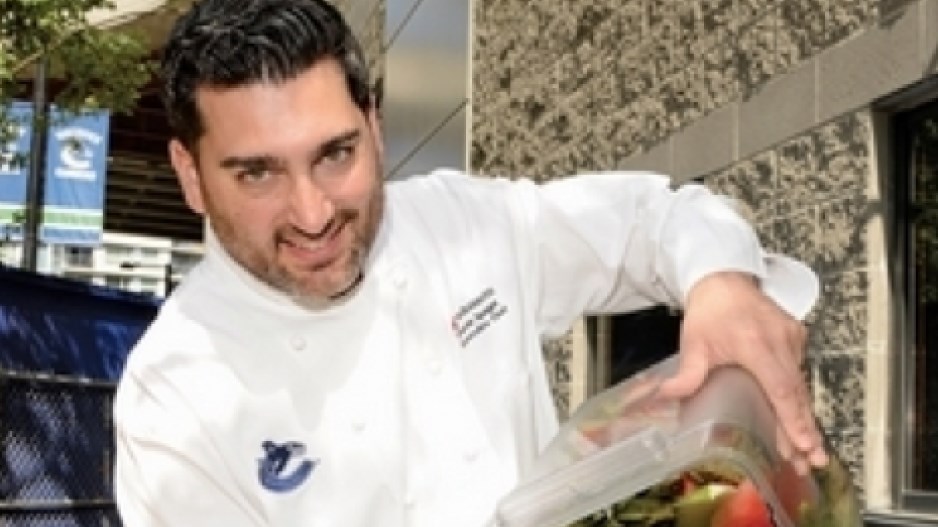Rogers Arena is one of several businesses trying to remove food waste and other organic materials from their garbage bins before tough new disposal rules take effect in Metro Vancouver, likely next year.
After launching a composting program in August 2012, “we haven't looked back,” said the arena's executive chef David Speight, a passionate recycler. Waste diversion is now commonplace in the kitchens, and it's gradually being extended throughout the facility.
The kitchen program produced immediate results, diverting 35% of garbage from landfills, up from 8% previously, Speight noted. “Staff had been asking for this type of program even before we implemented it, so … getting buy-in from them was easy.”
Employee training is one of the concerns raised by business owners during recent workshops organized by the regional district to promote awareness about its plan to encourage residents and businesses to remove all organic materials from garbage destined for the dump.
But Speight's experience suggests it's not likely to be a problem. “A lot of staff are doing this at home already.”
Each year, roughly 250,000 tonnes of food and other organic substances are tossed into the garbage. That represents about one-third of the region's total waste. When these organic materials rot in landfills, they produce methane, a greenhouse gas. But through diversion, they can become valuable products instead, such as compost and biofuels.
Metro has been working with restaurants, grocers, health facilities, schools, property managers and small businesses to explain how they can reduce and recycle food waste and food-soiled paper before new tipping rules take effect.
Individual municipalities, meanwhile, have developed similar programs for residential buildings. Most now collect food waste – fruits, vegetables, meat, cheese, dairy and bones – from single-family homes and are expanding collection to apartments and condos. The regional district has been working on a plan to ban organic materials from garbage bins for many years. Its goal is to increase the amount of waste diverted from landfills to 70% by the end of 2015 and 80% by 2020 – up from 58% today.
Although Metro doesn't yet have an implementation date for the ban, it's aiming for next year.
“Everyone needs to start taking [organic] waste out of their garbage,” said Sarah Evanetz, a manager for Metro's solid waste services. “That's the high-level message that we've been communicating with businesses.”
But there are still plenty of questions. Will implementation of the ban be immediate? Will there be allowable limits of organics in a load of garbage during a transition period? How quickly will financial penalties come into play?
The regional district has been surveying residents and businesses on implementation plans. Some businesses are worried about additional expenses, including the cost of private waste pickup, Evanetz acknowledged. But while the ban will present challenges, she said it will also create new opportunities for companies interested in processing organics.
Speight understands the frustration over financial penalties for failing to sort garbage but said it's the best way to get compliance from those who don't want to participate. “As soon as it becomes more expensive to have organics in your garbage, you're going to change and adapt.”
Although the goal for introducing the ban is 2015, Metro staff must still work out details and take a final plan to the board of directors for approval.




